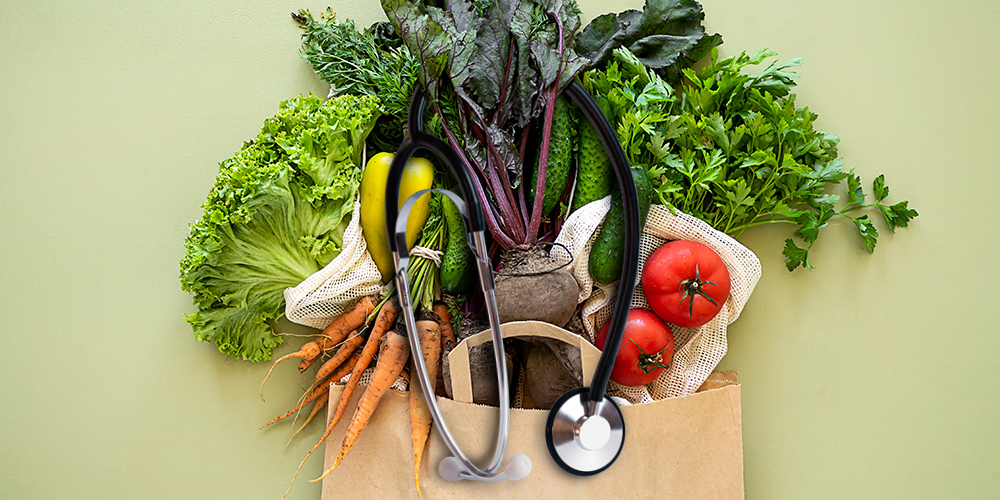‘Food is Medicine’: The (Intentionally) Missing Prescription in Healthcare
Americans are eager for healthcare providers to embrace the ‘Food is Medicine’ movement, but the system remains stuck in a pharmaceutical-driven model that ignores the power of food and nutrition to prevent and reverse chronic disease. Action Alert!
THE TOPLINE
- Poor nutrition is the leading cause of illness in the U.S., contributing to over 600,000 deaths annually and $1.1 trillion in preventable costs.
- A majority of Americans want more nutrition guidance from healthcare providers, yet fewer than half recall receiving such advice.
- Regulatory barriers and cronyism prevent the integration of nutrition and supplements into mainstream healthcare, keeping Americans dependent on costly pharmaceuticals instead of preventive solutions.
Each year, more than 600,000 Americans die from diet-related diseases, and our broken healthcare system racks up $1.1 trillion in preventable healthcare costs and lost productivity. Chronic diseases like obesity, diabetes, and hypertension are at epidemic levels, and rather than addressing the root cause—poor nutrition—the mainstream medical system continues to push pharmaceuticals as the solution. But Americans want change. A recent national survey found that a majority of respondents are eager for healthcare providers to engage in conversations about food and nutrition.
Yet, despite this overwhelming public interest, the healthcare industry remains largely silent on the issue. Why? Because acknowledging that food is medicine disrupts the entire pharmaceutical-driven model that has dominated modern healthcare for nearly a century. Fear of change is natural, but disruption is the only way to fix a broken system.
The Cost of Ignoring Nutrition in Healthcare
The evidence is clear: our current healthcare approach is failing. More than four in ten American adults are obese, and one in two has diabetes or prediabetes. The future looks even bleaker—most American children are predicted to have obesity by age 35. And it gets worse: America spends more on healthcare than any other nation, yet has highest rate of people with multiple chronic conditions compared with other high-income country, and sits a very lowly 80th in the global rankings for healthy life expectancy.
Poor nutrition is a leading cause of illness in the U.S., contributing to hypertension, cancer, diabetes, and more. In purely financial terms, the toll is staggering:
But the problem isn’t just financial. There are ripple effects on mental health, educational outcomes, and family stability, particularly for those with metabolic diseases. By ignoring the role of nutrition in health, we are allowing millions of Americans to suffer needlessly while footing an ever-growing medical bill.
What Americans Want—and What They’re Not Getting
The recent survey of U.S. adults highlights a massive disconnect between what people want and what the healthcare system provides:
- 52.0% said they would eat healthier if healthcare covered or provided nutritious food.
- 49.3% said they would change their diet if their healthcare provider talked more about food and nutrition.
Despite this demand, fewer than half of those surveyed recalled ever receiving food- or nutrition-related guidance from their primary care provider. This is unacceptable. Doctors should be at the forefront of the Food is Medicine movement, yet they are often silent because the system prioritizes prescribing drugs over prescribing dietary changes.
The reality is that the “Food Is Medicine” (FIM) movement is a broad, multi-stakeholder initiative that is heavily supported and promoted by the Rockefeller Foundation. History buffs will be well aware that the Rockefeller Foundation played a major role in the development of the pharmaceutical industry in the post-WWII era. Should we then be surprised that FIM initiatives all too often miss the mark?
Redefining Medicine: Overcoming Regulatory Barriers
One of the biggest obstacles to mainstreaming Food is Medicine is the artificial divide between food and drugs. The FDA treats any claim that a food can prevent or treat disease as a drug claim. This legal framework suppresses vital information about nutrition and wellness.
Take dietary supplements, for example. A recent report quantified the enormous benefits of using a few key supplements:
- Fish oil could prevent 174,811 coronary artery disease (CAD) events, saving $5.63 billion.
- Magnesium could prevent 93,349 CAD events, saving $3 billion.
- Vitamin K2 could prevent 274,933 CAD events, saving $8.86 billion.
- Vitamin D and calcium could prevent 335,518 fractures, saving $17 billion.

Instead of embracing these commonsense, cost-saving interventions, the FDA actively works against them, restricting what consumers can learn about supplements and their benefits. This is no accident—the FDA receives a significant portion of its funding from drug companies, creating an inherent conflict of interest. Pharmaceuticals are lucrative, and preventing disease with food and supplements threatens the bottom line of an industry built on treating symptoms rather than causes.
The Need for a Paradigm Shift
We are at a crossroads. Do we continue with the failed model of over-prescription and reactive treatment, or do we embrace a proactive approach that prioritizes nutrition, supplementation, and prevention? The answer is clear.
Leaders like RFK Jr. recognize that addressing the chronic disease epidemic requires a fundamental shift. We need a system where:
- Doctors and patients work together to create vibrant health.
- Preventative care is prioritized.
- Free speech and scientific transparency allow people to make informed health choices.
At ANH-USA, we have long advocated for this transformation, including redefining the arbitrary legal boundaries that separate food and medicine. We support the MAHA agenda in challenging the status quo and fighting for a healthcare system that serves the people, not corporate interests.
To help usher in a change in our medical system that recognizes the power of natural foods and medicines to heal us, send a message to Congress urging them to support policies that allow the free flow of information about supplements and natural health products.
Source: https://naturalblaze.com/2025/04/food-is-medicine-the-intentionally-missing-prescription-in-healthcare.html
Anyone can join.
Anyone can contribute.
Anyone can become informed about their world.
"United We Stand" Click Here To Create Your Personal Citizen Journalist Account Today, Be Sure To Invite Your Friends.
Before It’s News® is a community of individuals who report on what’s going on around them, from all around the world. Anyone can join. Anyone can contribute. Anyone can become informed about their world. "United We Stand" Click Here To Create Your Personal Citizen Journalist Account Today, Be Sure To Invite Your Friends.
LION'S MANE PRODUCT
Try Our Lion’s Mane WHOLE MIND Nootropic Blend 60 Capsules
Mushrooms are having a moment. One fabulous fungus in particular, lion’s mane, may help improve memory, depression and anxiety symptoms. They are also an excellent source of nutrients that show promise as a therapy for dementia, and other neurodegenerative diseases. If you’re living with anxiety or depression, you may be curious about all the therapy options out there — including the natural ones.Our Lion’s Mane WHOLE MIND Nootropic Blend has been formulated to utilize the potency of Lion’s mane but also include the benefits of four other Highly Beneficial Mushrooms. Synergistically, they work together to Build your health through improving cognitive function and immunity regardless of your age. Our Nootropic not only improves your Cognitive Function and Activates your Immune System, but it benefits growth of Essential Gut Flora, further enhancing your Vitality.
Our Formula includes: Lion’s Mane Mushrooms which Increase Brain Power through nerve growth, lessen anxiety, reduce depression, and improve concentration. Its an excellent adaptogen, promotes sleep and improves immunity. Shiitake Mushrooms which Fight cancer cells and infectious disease, boost the immune system, promotes brain function, and serves as a source of B vitamins. Maitake Mushrooms which regulate blood sugar levels of diabetics, reduce hypertension and boosts the immune system. Reishi Mushrooms which Fight inflammation, liver disease, fatigue, tumor growth and cancer. They Improve skin disorders and soothes digestive problems, stomach ulcers and leaky gut syndrome. Chaga Mushrooms which have anti-aging effects, boost immune function, improve stamina and athletic performance, even act as a natural aphrodisiac, fighting diabetes and improving liver function. Try Our Lion’s Mane WHOLE MIND Nootropic Blend 60 Capsules Today. Be 100% Satisfied or Receive a Full Money Back Guarantee. Order Yours Today by Following This Link.







